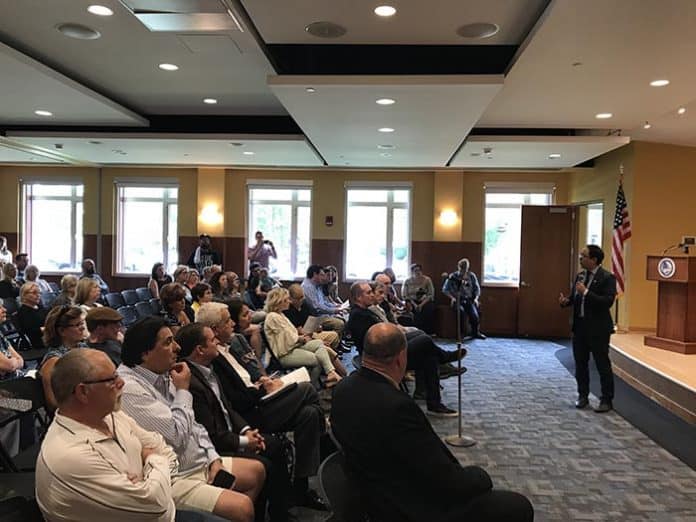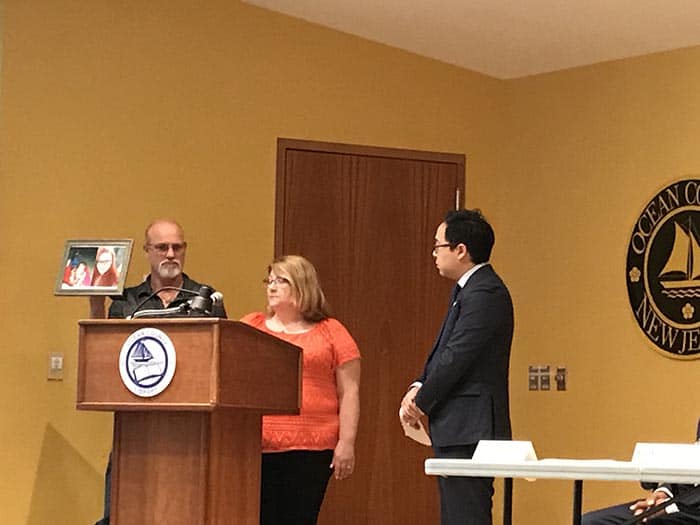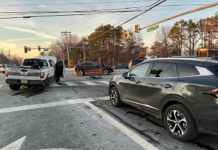
TOMS RIVER – A Town Hall-style meeting of people on the front lines of the opioid epidemic was held recently. The goal: to identify the roadblocks to solving the crisis.
The meeting was held at the Toms River branch of the Ocean County library, hosted by Congressman Andy Kim (D-3). He said addiction has been mentioned at every town hall he’s hosted, but he’s just not seeing the same level of urgency in Washington, D.C.
According to state figures, there were 3,118 deaths suspected of overdose in 2018. As of June 3, the figure for 2019 is 871. (The state uses the term “suspected” deaths because until the lab tests confirm, the victim is only suspected of dying from an overdose.)
But these are just statistics, and they hide the personal impact that drugs have. That’s why there were several people at the town hall who told their story.
Lisa Cook lost her 25-year-old daughter, Danielle, last year. Danielle was the type of person who once pulled over when she saw an elderly couple having trouble, and took time out to help them.
She didn’t know that a boyfriend had laced marijuana with harder drugs, and she became an addict, Cook said.
There were many times that Danielle tried to get better but the system failed her: Insurance wouldn’t pay for more than 14 days during one rehab stint; a court officer told her she’d never be clean; and patient privacy laws kept her parents in the dark.

It was key points like this that the experts needed to know in order to forge policies and change how people address the epidemic. Some of the suggestions are as follows:
- Easier access to treatment. Several of the speakers said this was crucial. Heather Shapter, with the New Jersey Organizing Project, said someone should be able to Google addiction treatment and find something right away. “When an addict has a moment of clarity,” that’s when you have to treat them. Pamela Capaci, CEO of Hope Sheds Light, said you are asking a lot of someone dealing with addiction to navigate multiple systems of care. It should be streamlined.
- Samir Jani, of Garden State Medical Center, said that he can view a patient’s prescriptions from any provider in the state, and even some other states. However, the network doesn’t cover the entire country, and patients can still get prescription painkillers from certain states and keep it secret in New Jersey. He wants to see a more comprehensive, country-wide network.
- Kimberly Reilly, Alcoholism and Drug Abuse Coordinator for the Ocean County Health Department said that when someone dies of an overdose, certain statistics like age and gender are recorded. However, that doesn’t tell the story. That doesn’t explain why they went down the path they did. If that can be learned, then we wouldn’t have to wait for someone to hit rock bottom before they can be helped. “There’s a story behind someone who has died of an overdose,” she said. “Tell me what worked, and what didn’t work.” She said this information would help drive policy and inform grant writing.
- Pamela Capaci, CEO of Hope Sheds Light, said that people with addiction have to navigate a complicated system to just to get help. The system is also short-sighted, looking to help people in the immediate term when addiction is really a long-term issue.
- Prosecutor Bradley Billhimer said that the dangers of drugs have to be discussed to even younger kids than what is being done now. They have to be taught how to make good choices and how to rebound from bad ones. Fentanyl amounted to 10 percent of overdose labwork in 2014, but that is up to 70 percent in 2018. “People have to know they’re playing Russian roulette.”
- Eric McIntire, vice president of the RWJBarnabas Health Institute for Prevention and Recovery, said that anyone revived from an overdose is met with an addiction counselor in the hospital. The counselor is a recovered addict, so they talk the talk and walk the walk. There’s only a curtain between beds sometimes, and the person on the other side will ask for help with their addiction as well. “Why does someone have to almost die to get help?” he asked. What’s needed is the human connection. People need access to recovery specialists before they are hospitalized, who can guide them to the next step.
- Heather Shapter, with the New Jersey Organizing Project, said a car crash made her addicted to prescription painkillers, which led to heroin. Purdue Pharmaceutical marketed oxycontin, downplaying its addictive properties. The state is currently suing the Sackler family who allegedly had a lot to do with that, but Shapter said they should be accountable in other ways, including a windfall tax. She described the first hand problems she had with trying to get clean, including driving 75 minutes each way to find a doctor since every local one was full.

Other challenges discussed included:
- Insurance companies shouldn’t be able to dictate treatment.
- Transitional housing. There is a lack of places to put people in recovery.
- Lower the stigma related to substance abuse disorder.
- Start talking the language of recovery, and making goals.
Congressman Kim said these suggestions would be collected and discussed to see if they can be addressed legislatively.
A hand-out given at the meeting provided resources for people needing help:
Local Providers
Mental Health Association in New Jersey in Ocean County
25 South Shore Drive, Toms River, NJ 08753
Contact Rachel Odea at: rodea@mhanj.org or 732-244-0940.
mhanj.org/mhanj-in-ocean-county/
Seashore Family Services of NJ
35 Beaverson Blvd. Bldg 8 Suite 8A, Brick, NJ 08724
732-920-2700
226 Main St. Toms River, NJ 98753
732-244-1600
seashorefamilyservices.org/substance-abuse/
Ocean County Health Department
732-341-9700
175 Sunset Avenue, Toms River
ochd.org/alcohol-and-drug-services/#alcohol
Preferred Behavioral Health
Locations in Toms River, Barnegat, Lakewood
732-367-4700
preferredbehavioral.org/services/substance-use-services/
Barnabas Behavioral Health
1691 U.S. Highway 9 CN 2025, Toms River
732-914-1688
rwjbh.org/our-locations/behavioral-health-center/barnabas-healthbehavioral-health-center/
St. Francis Counseling Services
4700 Long Beach Blvd., Long Beach Twp.
609-494-1554
stfranciscenterlbi.org/counseling
Ocean Mental Health Services
160 Atlantic City Blvd. Bayville
732-575-1111
oceanmhs.org/substance-abuse-services/
Agape Counseling Services
815 Route 9, Lanoka Harbor
609-242-0086
Daytop Village of New Jersey Inc. (Ocean Outpatient)
399 Main Street, Manahawkin
732-875-1090
Hotlines
ReachNJ (Department of Human Services)
ReachNJ is a 24-hours-a-day, 7 days-a-week addictions hotline
844-732-2465
MHA NJ Connect for Recovery
855-652-3737
NJ Addiction Services Hotline
844-276-2777
Hope Sheds Light
855-350-2790
SAMHSA’s National Helpline (US Dept. of Health and Human Services)
1-800-662-HELP (4357)
Anonymous Support Groups
narcoticsanonymousnj.org/meetings/
Additional Resources
- Treatment Facility Locator: samhsa.gov/
- Division of Consumer Affairs, Board of Marriage and Family Therapists, Alcohol and Drug Counselor Committee: nj.us/lps/ca/medical/familytherapy.htm
- Governor’s Council on Alcoholism and Drug Abuse: nj.us/treasury/gcada/
- Evidence-Based Practices for Treating Substance Abuse Disorders: washington.edu/ebp/
- National Institute on Drug Abuse: nih.gov
- National Institute on Alcohol Abuse and Alcoholism: nih.gov
- Substance Abuse and Mental Health Data Archives: umich.edu/SAMHDA/







